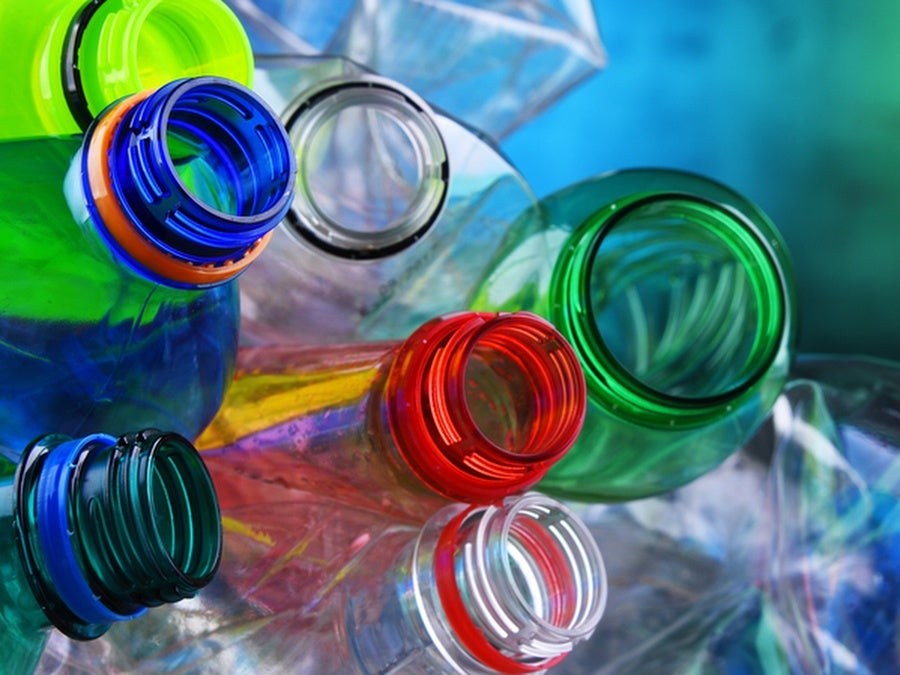Coca-Cola Hellenic Bottling Company (HBC), Nestlé and Danone have been slammed with greenwashing allegations over their water bottle production.
The Bureau Européen des Unions de Consommateurs (BEUC), Environmental Coalition on Standards (ECOS) and environmental non-profit ClientEarth today (7 November) confirmed the filing of the legal complaint, made to the European Commission and to the EU’s consumer protection authorities (CPC).
The complaint revolves around “misleading commercial claims about the recyclability of their products”.
The key points of concern pointed out by BEUC were the terms “100% recyclable” and “100% recycled”, as well as the use of green imagery which prompts “the false idea of environmental neutrality”.
In a statement, the BEUC said recycling rate for PET beverage bottle bodies is estimated to be “only 55% in the EU” and the chance of it becoming a bottle again stands at “around 30%”.
It added: “The average European consumer drinks around 118 litres of bottled water per year and 97% of this water is packaged in plastic containers.”
Ursula Pachl, deputy director general of BEUC, said consumers are trying to make more sustainable choices but are “bombarded with incorrect and deceptive claims, so they do not know which claim or label to trust”, adding that “this greenwashing must stop”.
“The EU is taking much welcomed steps with how to help clean up the market from deceiving green claims. However, it will take years before new regulatory measures will apply and there is no time to waste, so we expect authorities to take action quickly,” she said.
In September, the EU said it was moving forward with plans to tighten rules on “misleading” labelling claims pertaining to a product’s ‘green’ credentials.
Justin Wilkes, executive director of ECOS, said: “Policymakers must set clear rules on recycled content that are implemented by standardised reliable methodologies, putting an end to the Wild West of green claims.”
Rosa Pritchard, plastics lawyer at ClientEarth, added: “The reality is single-use plastic is neither circular nor sustainable. Recycling can never catch up with the sheer volume of plastic produced on our planet.
“Companies are in a unique position to change how we consume but currently these claims – which we consider to be misleading – are making it hard for consumers to make good environmental choices.”
Just Drinks approached Coca-Cola HBC, Nestlé and Danone for comment on the allegations.
A spokesperson for Danone stated: “At Danone, we strongly believe in the circularity of packaging – and will continue to invest and lead the campaign for better collection and recycling infrastructure alongside our partners.
“We have also made real progress on our journey to reducing single-use plastic and virgin plastic use in parallel (-10% in absolute since 2018).”
Danone claimed that around 50% of its water sales worldwide, by volume, were housed in reusable packaging in 2021.
Meanwhile, the Europe and Africa bottling company for Coca-Cola has pledged that 100% of its consumer packaging will be recyclable by 2025.
It stated in response to the legal filing that it is “investing to collect and recycle the equivalent of the packaging we use”.
The bottler added: “We only communicate messages on our packaging that can be substantiated, with any relevant qualifications clearly displayed to enable consumers to make informed choices. Some of our packaging carries messages to drive recycling awareness, including whether our packages are recyclable and if they are made from recycled content.”
Coca-Cola HBC said at the end that “more must be done”.
Nestlé is aiming for 100% of its plastic packaging to be reusable or recyclable by 2025, up from 85.8% in 2022.
A spokesperson for the Swiss company said: “We work hard to reduce the amount of plastic packaging we use; to lead investments and support packaging circularity alongside partners, and to communicate clearly with consumers who want to make informed choices.
“Nestlé has reduced its amount of virgin plastic packaging by 10.5% since 2018, and we are on track to get to one-third less virgin plastic by the end of 2025.”
The Ellen MacArthur Foundation’s recent Global Commitment progress report revealed several FMCG giants are significantly lagging on their 2025 sustainable plastic use targets.
For example, The Coca-Cola Company used 8% more virgin plastic packaging in 2022 compared to 2019.









